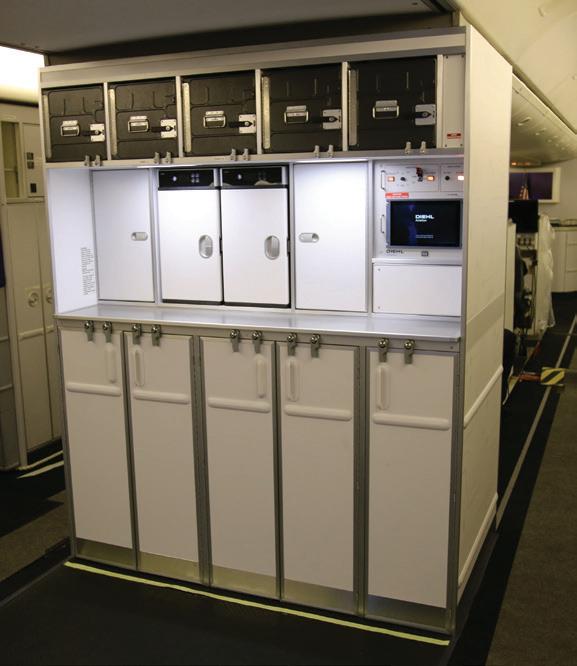
6 minute read
SKY TRIALS Diehl Aviation is part of the Boeing 2019 ecoDemonstrator program that takes tech from the lab to the sky to test the latest industry innovations
Sky
trials by JANE HOBSON
Diehl Aviation is part of Boeing’s 2019 ecoDemonstrator program that takes tech from the lab to the sky to test the latest industry innovations
As tech suppliers race to keep up with the demand of modern travelers, smart and intelligent cabins are on-track to become the norm of the future. Whether its solutions that improve safety, reduce fuel use and emissions, or enhance cabin amenities, galleys, seats and lavatories, the latest innovations aim to improve the challenges facing airlines, passengers and the environment today.
But, before these smart technologies can solve anything, they must be tried in the sky. The Boeing ecoDemonstrator Program is perhaps one of the most well-known tech-testing initiatives in the aerospace industry today. The program, created in 2010, accelerates innovation by taking promising aircraft technologies out of the lab and testing them in the air. A different aircraft is used each year as a flying test-bed to evaluate projects. Since 2012, the program has tested 100 technologies on five aircraft, and more than one third of the tested innovations have been classified as ready for implementation. Announced in July, the 2019 ecoDemonstrator 777-200 is testing 50 technologies, including shape-memory alloy parts from NASA, as well as a variety of connected cabin technologies that make galleys, seats and lavatories smart, monitor cabin conditions such as temperature and humidity to facilitate automatic adjustments, and use organic LED displays on bulkheads and in the ceiling to inform and entertain passengers. Innovations from KID-Systeme, Etihad Engineering,
The Boeing 2019 ecoDemonstrator 777 is testing 50 innovative technologies for galleys, seats, lavatories and more

Diehl’s eSmart Galley monument is equipped with multiple sensors, an Air Refrigeration Unit and a newly developed smart panel that allows the crew to control the galley via a touch display
Collins Aerospace, Bühler Motor, Jeppesen, Safran, Embraer, Honeywell and Diehl Aviation make the list of partners on the flying test-bed.
ecoDemonstrator flight-tests started last November and mainly concentrated in the Seattle area, but made one special stop made at Frankfurt Airport (FRA) on November 19 and 20, 2019. Organized by Boeing and Fraport, the ecoDemonstrator European Expo invited government officials, industry represents and STEM students to attend the technology exhibition, listen to presentations and go aboard the 777. More than 1,200 visitors toured the aircraft during its Frankfurt stay. During the ecoDemonstrator’s static display in Germany, integrated cabin interiors company Safran Cabin announced the launch of SOPHY on the test-bed as part of its Smart System Integrator Galley. The smart trolley solution optimizes catering operations by collecting, sharing and communicating data in real-time with other SOPHY-activated equipment through a ‘mesh’ network. Among other partners, KID-Systeme also joined the i+sCabin project to test communications standards, wireless communication sensor networks and smart functions of galleys, as well as to collect data for predictive health monitoring. The communication standard project is expected to be finalized in 2021.
Diehl Aviation is testing its eSmart Galley monument on the ecoDemonstrator 777. Tammo Bahns, Predevelopment Cabin Monuments, Diehl, tells PAX Tech the galley monument is a prototype of Diehl Aviation’s idea of a smart galley. It is equipped with multiple sensors, an Air Refrigeration Unit and a newly developed smart panel. The smart panel is the central control unit of the eSmart Galley. The crew can control the galley via a touch display. In the background, the smart panel performs power management functions and connects the galley and its data to the cabin network. “The ecoDemonstrator is a perfect fit because we test and gather feedback about the galley and the cabin network communication under real flight conditions,” Bahns says. “A goal is to motivate more airlines to participate in the development of the communication standard.”
Diehl Aviation is also consortium leader for Intelligent and Smart Cabin (i+sCabin), an ecoDemonstrator partner consisting of several other companies and organizations. The goal of i+sCabin is to facilitate the collection and exchange of data to generate a real-time status of all aircraft cabin areas during flight, and eventually a standard for cabin communications. Diehl was chosen as the consortium leader by the German Federal Ministry for Economic Affairs and Energy (BMWi) within the LuFo V-3 program. Diehl has a history running successful LuFo research programs.
“Similar to Internet of Things (IoT) standards, the i+sCabin specifies communication protocols to connect intelligent cabin systems and sensors,” Marvin Ehrmann, Diehl’s Product Manager of Aircraft Systems, told PAX Tech in January. “To facilitate industry wide adoption, open protocols are used. The goal is to facilitate different use cases ranging from predictive maintenance to cabin crew operations and passenger comfort.” Diehl is also part of OPstimal, another research project funded by BMWi as part of LuFo. On board Boeing’s ecoDemonstrator as well, and marking Diehl’s third involvement, OPstimal is concerned with turnaround processes, Ehrmann says. It looks at predictive maintenance of cabin and avionics components.
Connected cabin technologies is one of Diehl’s strongest development focuses right now, and the company’s involvement with the 2019 ecoDemonstrator is just one of the many ways Diehl is showing the industry its strength in innovation. Diehl’s Cabin Area Network System and Service (CANSAS) is a modular cabin management system with a scope of operation of almost all aircraft cabin functions, which is available on an open platform. Whether it’s inflight entertainment, social media, lighting or one of the many functions in the lavatory, galleys or seats, CANSAS brings cabin functions together in one place. The base network functions as the control foundation and communications interface, with high data-transfer rates. This setup makes it easier to integrate onboard and on-ground services for multiple cabin elements.
Diehl’s Bookable Bin enhances the pre-boarding experience for passengers by enabling travelers to reserve the luggage space they require before arriving at the airport. This takes pressure off cabin crew as they no longer have to spend time trying to stow luggage. Cabin crew are also alerted about the boarding process, free space, potential damage to luggage and whether the bins are securely closed. This data is transferred automatically via an interface to the relevant MRO provider at the destination airport so that any potential problems can be addressed before landing. The data collected can then be used in Big Data and predictive maintenance procedures. “Product innovations from Diehl Aviation don’t just make the aircraft cabin a smart place – they are set to enhance the entire passenger experience, all the way from pre-boarding,” explains Ehrmann. “These innovations are also designed to be easy to use for all, from airline operators to MRO service providers.”
In the future, Ehrmann says users will be able to create profiles on a smartphone or tablet application that allows them to select their meals, drinks and entertainment packages in advance, specify their language and lighting of choice, and even choose the most direct route to their seats.
“Using a corresponding interface, crew will be able to manage armrest and seatback positions, tray tables, safety belts, water tanks, soap dispensers and so on,” Ehrmann says. “For example, if one passenger’s safety belt isn’t correctly inserted or the seatback is not upright on take-off or landing, a sensor will send a signal to the crew’s end device so they are able to rectify the situation immediately.”
Diehl is also making a move to offer comprehensive and inclusive services in the future, rather than just innovative products. The focus on creating new hardware will continue, but the company will offer additional options such as ‘lease your system,’ using Diehl’s powder coating. Using this technique, Diehl could use all the white surfaces in the cabin as smart surfaces for projection systems. The carrier can display its branding or lease the space for adverts.
“This is a completely new business field that could be of considerable significance to a wide variety of lessors, airlines and brands,” said Ehrmann.
In the meantime, Diehl will continue gathering data from its participation in the i+sCabin research project, which will run until 2021.










